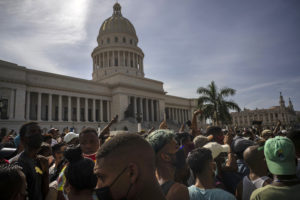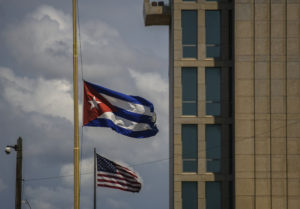By Marc Hanson
The domestic political landscape that has kept the United States’ failed embargo on Cuba in place for over fifty years is shifting rapidly. Hardline, anti-Castro policies used to be a prerequisite for politicians running for office in Florida and for presidential candidates who wanted to win Florida’s electoral votes, but recent events have shown that adopting a pro-embargo stance appears to be unnecessary and could even be detrimental. Today's release of the results of a national poll by the Atlantic Council confirms these changing dynamics, showing majority support nationwide for an end to the embargo and even stronger support in Florida and among Latino voters.
High-visibility Floridians call for an end to the embargo
In the past few weeks, a number of high-profile Floridians have publicly called for changes in U.S. policy toward Cuba. First, Florida state Senator Nan Rich, who is running for the Democratic nomination for governor in Florida, came out against the embargo, citing the 51-year-old policy’s failure to bring about regime change in Cuba and its cost to the U.S. economy. Only a few days later, fellow Democratic candidate Charlie Crist echoed Rich’s comments, stating that “If we want to bring democracy to Cuba, we need to encourage American values and investment there, not block ourselves out and cede influence to China.” Crist, who was the Republican governor of Florida from 2007 to 2011 and joined the Democratic Party in 2012, made his statement on national television during an appearance on Real Time with Bill Maher on HBO.
Rich and Crist’s statements mirror important signals from prominent Cuban-American business and civic leaders. Last week, billionaire sugar baron and long-time embargo supporter Alfonso “Alfy” Fanjul spoke publicly about his two recent visits to Cuba and his interest in conducting business on the island. Jorge Perez, a powerful business leader in Miami (for whom the new Perez Art Museum Miami is named), also decried the United States’ unilateral policy and called for U.S.-Cuba exchanges, saying that he hoped to see Cuban art—even from artists with ties to the Castro government—in his museum.
Broader political context and public opinion
Not too long ago, voicing opposition to the embargo would have been political suicide in Florida. But the public announcements of Rich, Crist, Fanjul, and Perez show that the political calculus has changed and that supporting normalization of relations with Cuba is no longer a political liability. More broadly, the statements of Rich, Crist, Fanjul, and Perez are manifestations of a growing desire for a more moderate U.S. policy toward Cuba, even in Cuban-American strongholds such as Miami.
While conventional political wisdom has long held that a hardline stance on Cuba is necessary to win Florida in a presidential election, this is no longer the case: President Obama won Florida in both the 2008 and 2012. In fact, in 2012, President Obama—who in his first term loosened travel restrictions for non-Cuban Americans, lifted the limits on remittances that Cuban Americans send to family members on the island, and allowed Cuban-American families to visit Cuba as much as they wanted—increased his percentage of the Cuban-American vote by ten points. And in 2012, the hardline bloc’s historical dominance of Cuban-American politics finally came to an end: incumbent Rep. David Rivera, a hardliner, was defeated by moderate Cuban-American Joe Garcia. Since his election, Rep. Garcia has continued to take a constructive approach on Cuba by defending Cuban-American family travel and unlimited remittances.
There is also a persistent generational divide that shows increasing support among younger Cuban-Americans to end the U.S. embargo. Younger Cuban-Americans have long held less hardline positions than their parents and are becoming more closely aligned with anti-embargo views shared by the broader Latino community.
The Atlantic Council’s February 2014 poll reflects a continued preference among U.S. voters to end the embargo and travel ban: according to the poll, 56 percent of Americans nationwide support normalization of relations between the U.S. and Cuba, while only 35 percent support the embargo. Even more striking is what the poll tells us about attitudes toward Cuba in Florida, where 63 percent support normalization and only 30 percent want the United States to keep the embargo in place. Coupled with the anti-embargo statements made by prominent Floridians in the past few weeks, the poll demonstrates that the conventional wisdom on U.S.-Cuba policy has been upended.
Even more interesting than the poll results themselves will be what the Obama administration decides to do with the political space that it has been presented. Will they pursue a U.S.-Cuba policy that aligns more closely with American preferences and more effectively advances our national interests? With such an abundance of political space, it appears that they'll be free to do so.
Marc Hanson is WOLA’s Senior Associate for Cuba.


